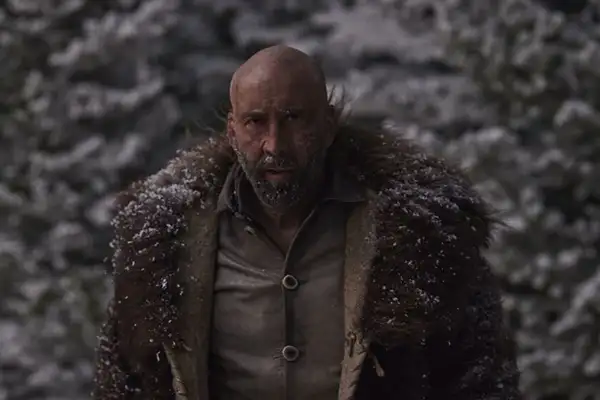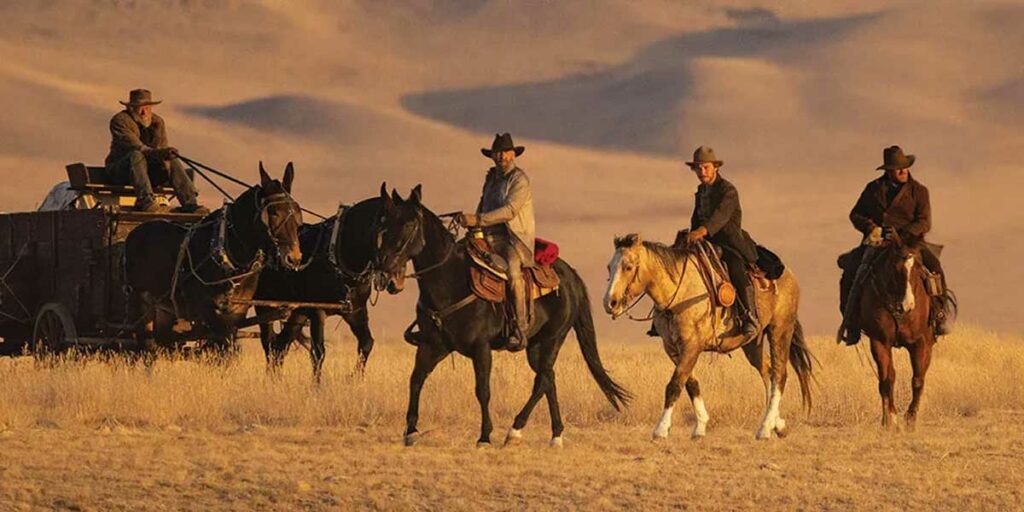Butcher’s Crossing features a solid Nic Cage performance and an okay sense of craft but loses sight of its characters and greater ideas.
There’s a question posed at the center of survivalist western Butcher’s Crossing. It’s asked by Will Andrews (Fred Hechinger), the young, sheltered college boy from the city who has found himself out in the wilderness of the yet-to-be-developed American West as part of a buffalo-hunting expedition, and it’s directed at the rugged, resolute leader of the crew who simply goes by Miller (a bald and bearded Nicolas Cage). Given the brutal, dangerous nature of the work involved, the lack of a guaranteed payout for one’s efforts, and plenty of other viable ways to make a living in a country slowly being transformed by industrialization, why choose to hunt buffalo?
It’s a facet of Miller left open for the audience to absorb and ponder, as he doesn’t offer any sort of response. But as the four-man crew, hundreds of miles away from home, become captive to Miller’s intense obsession and slowly unraveling sense of mental well-being, the question of his single-minded fixation on scoring the biggest buffalo hide any man has ever seen becomes the crux of a life-or-death scenario for everyone in his vicinity.
Based on John Williams’ 1960 novel of the same name, director Gabe Polsky’s adaptation of Butcher’s Crossing aligns and compresses the themes of survival and the shifting American frontier during the 1870s into the dichotomy between the fanatical Miller and the sincere idealism of Andrews, who dropped out of Harvard in order to find some sort of new, ill-defined purpose for himself out in the world. When he meets Miller and agrees to fund and accompany his group out to a remote valley in Colorado where hundreds of the dwindling buffalo population allegedly still roam free, he has yet to realize the harsh realities of the ways in which American trade ravages nature and the human spirit.
These ideas seem like they should heavily define the narrative trajectory. Indeed, the novel is a bit more explicit with Andrews’ gradual disillusionment regarding man’s relationship with nature by positing his journey as one inspired by works of poetry and the ideas of Ralph Waldo Emerson. But here, they become more incidental factors in what is ultimately a fairly sturdy but draggy little thriller, interested more in the pure suspense of the scenario than exploring the greater themes with too much depth.

Not that simplifying this story down to its most fundamental elements is an immediate deal-breaker—I’m happy to watch a well-built genre programmer that lets Cage, one of our greatest performers for such a thing, dig deep into a brutish character whose intimidating disposition is outweighed only by his unwavering avariciousness. His performance as Miller is well-calculated and more subdued than you may expect, his aura as the threatening, committed hunter conveyed through stony glares and a stern command of his party. But the full scope of the dynamic between him, Andrews, and the other men—rounded out by Jeremy Bobb as sleazy skinner Fred and Xander Berkeley as the one-armed wagon driver Charlie—becomes frustratingly lost within the screenplay by Polsky and Liam Satre-Meloy.
The lumbering narrative and workmanlike filmmaking never properly convey the slow descent into madness that’s baked into the fabric of the premise. The terse relationship between the men sits at surface level quarreling before an inevitable turn to violence and desperation that feels more obligatory than an authentic collapse of civility.
The deterioration of Andrews’ condition in particular is occasionally conveyed through quickly edited montages of images that are haunting him—that of the buffalo they’re slaughtering or of a sex worker he bowed out of sleeping with—but there’s a distance to the viewer’s relationship with him that makes it difficult to imbue them with any truly significant meaning. It speaks to the larger issue of a lack of true interiority to these characters that would allow the viewer to feel the real weight of their situation or their actions.
Polsky does occasionally stumble onto an inherently striking image or worthwhile concept, such as the queasy, grim savagery that accompanies the view of dozens of skinned buffalo that are being systematically massacred, or the idea that these are the last breed of a certain kind of American man as the buffalo hide business is slowly dying off while industry encroaches on the West. But these highlights typically get lost to the indistinct approach to character, as well as an unremarkable visual style (including one stand-out sequence of hilariously bad green screen). When Andrews later in the film says that he may have finally seen what he set out to see, it’s hard to echo the sentiment as a viewer.
Butcher’s Crossing was released in US theaters on October 20, 2023.

